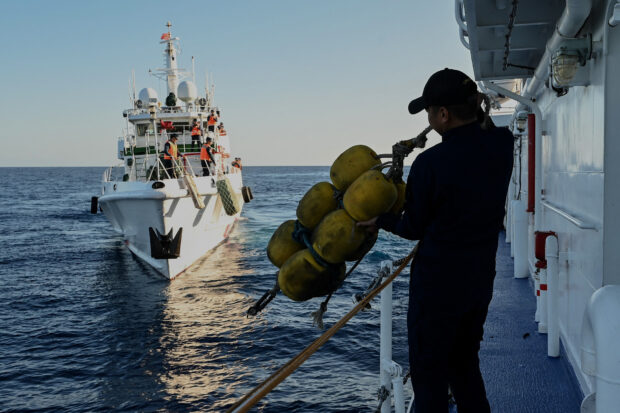
FACE-OFF | A Philippine Coast Guard crew member, holding a rubber fender, watches as a China Coast Guard vessel sails near the BRP Sindangan during a supply mission to Ayungin (Second Thomas) Shoal in the West Philippine Sea, on Tuesday, March 5, 2024. (Agence France-Presse)
PUERTO PRINCESA CITY—The Philippine supply boat that bore the brunt of a water cannon attack and dangerous blocking maneuvers by China Coast Guard (CCG) vessels on Tuesday was just on an experimental voyage to Ayungin (Second Thomas) Shoal in the West Philippine Sea, a top military official said.
The Unaizah May (UM) 4 did not even carry supplies for the rotation and resupply (Rore) mission as its sole objective was to check whether it can enter the low-elevation shoal, said the chief of military’s Western Command (Wescom), Vice Adm. Alberto Carlos, who was onboard the vessel during the eventful trip.
Bigger than the regularly used UM 1 and 2 supply boats, the UM 4 arrived at the Naval Forces West detachment in Puerto Princesa City on Wednesday after the aborted mission, which Carlos said he had joined “to see for myself whether we can use this in future Rores.”
The test, however, was unsuccessful, as two CCG vessels blocked the boat through dangerous maneuvers and blasted it with water cannon.
READ: China Coast Guard fires water cannon at PH ship again
The water attack shattered UM 4’s windshield, destroyed closed-circuit television cameras and monitors, and injured four crew members.
In a statement on Wednesday, Defense Secretary Gilberto Teodoro Jr. said China’s actions were “patently illegal and downright uncivilized.”
The defense chief took offense at the statement of the Chinese Embassy in Manila stating that the response of CCG vessels to the Philippine ships was “professional, restrained, reasonable and lawful.”
Shallow entrance
“This claim is, simply put, one that no right-thinking State in the world agrees with and which many outright condemn. [China’s] vain attempt to manufacture and sell this story falters in the face of real incontrovertible facts,” he said, urging Beijing “to be truthful and to be believable.”
Although it was its first voyage to Ayungin, the UM 4 had already been used in two previous “test missions” in the Palawan island towns of Cuyo and Balabac, according to Carlos.
“Since it is bigger, it has a deeper draft so our concern is whether it can enter the shoal because its entrance is shallow,” Carlos told reporters on Wednesday.
Even though the test was not completed, the Wescom chief said he considered the Rore mission to be successful as the UM 1 was able to reach and enter Ayungin to deliver supplies and relieve troops aboard BRP Sierra Madre, a grounded warship that serves as a Philippine outpost in Ayungin.
“At least our primary mission to resupply and rotate the troops was done and they are now aboard UM 1,” he said.
“For our secondary objective, unfortunately due to the illegal and coercive actions of China, we were not able to complete it, but the important thing is that all the troops aboard UM 4 are safe with only minor injuries,” Carlos said.
The Philippines on Wednesday accused China of “deliberately stirring up trouble” in the West China Sea.
Jonathan Malaya, spokesperson for the National Task Force on the West Philippine Sea, said China was “maliciously inciting hype” while reiterating that the Philippines would not be deterred from exercising its maritime rights.
Long ‘patintero’
He added that the waterway was wide enough for both countries to peacefully coexist.
Carlos heaped praise on the crew of the UM 4 for their skillful maneuvering, evading several blocking attempts of CCG and maritime militia vessels.
“I have to give credit to the crew of UM 4. We went through quite a long ‘patintero’ (a native game of tag). For more than three hours and 20 miles out (from Ayungin Shoal), we were able to get as close as eight miles so we covered 12 miles against dangerous maneuvers of China,” he said.
Carlos said he noticed that China was a bit more serious with their monitoring of the Rore mission this time with a new vessel involved.
“They started shadowing us at 4 in the afternoon of the previous day (Monday). A helicopter flew over us five times; the last two were very close. I thought it was usual but when I looked out, i said it’s already very unusual,” he said.
“They spent about one hour circling so that’s an indication that they are really serious in monitoring UM 4 because maybe they saw a new boat,” he noted.
They were again shadowed at 5 a.m. the next day, some 30 kilometers away from Ayungin, which Carlos said, was quite unusual.
But, Carlos also said that they expected the water cannoning and already knew what to do.
“There is already an SOP (standard operating procedure) to drop which was what we did because we were inside the bridge,” he said.
“The crew prepared for possible flooding of the engine room just like what happened to ML Kalayaan. So we prepared for that, the crew took actions to prevent that,” he added.
The Kalayaan was also attacked with water cannons by a CCG fleet in November last year.
Despite the minor setback, the military will give the UM 4 another shot to try to reach Ayungin. “We tried our best. We’re gonna do it again. We have to test whether this can enter the shoal because UM 1 is a bit small so we would like to use this in future Rores,” Carlos said.